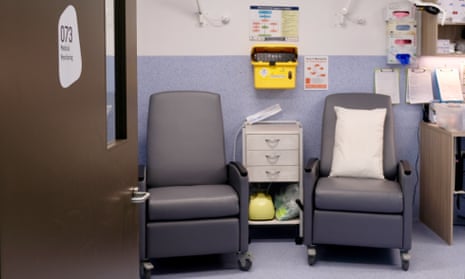Drug addicts should be allowed to use illicit substances in “supervised injecting facilities” with medical staff on hand to ensure no one dies, health groups are urging ministers.
Senior doctors, public health specialists, drug experts and health charities want the government to approve trials of “overdose prevention centres” (OPCs) to cut Britain’s soaring toll of drug deaths. Supporters of the idea say that while letting users consume hard drugs in safe places, watched over by nurses and doctors, is controversial, it reduces fatalities and drug-related crime.
Scores of organisations and individuals working in the health and drug fields have signed a statement co-ordinated by the Faculty of Public Health (FPH) calling on ministers to permit the creation of some centres in order to save lives.
Drug-related deaths hit a new record of 5,900 in Britain last year. There were 4,561 in England and Wales. Almost half of such poisonings involved opiates, including heroin, and 777 deaths involved cocaine. “Urgent action is needed to tackle the spiralling rates of drug deaths across the UK. Drug deaths are avoidable and it is unacceptable that we see evidence-based actions to prevent harm such as OPCs go unutilised in the UK,” the statement says.
“OPCs are healthcare facilities where individuals consume their own drugs supervised by trained staff who can intervene if they overdose.”
Signatories include the Academy of Medical Royal Colleges, the Association of Directors of Public Health, charities such as the Hepatitis C Trust and National Aids Trust, and the drug reform campaign group Transform.
Professor Maggie Rae, the president of the FPH, said the 6,000 deaths “are lives we can save”, adding: “As health and care professionals, we are guided by the imperative of protecting health and saving lives, and nothing else. Government has a moral duty to take all steps possible to protect health; and to ignore this call and the clear evidence in support of OPCs as a life-saving measure is to accept the continued loss of thousands of lives across the UK.”
Drug consumption rooms have been used in many European countries since the emergence of Aids in the 1980s as a way of reducing diseases associated with drug use. The Netherlands has a network of several dozen, Germany has more than 20 and there are others in Spain, Denmark and Switzerland. At most centres, staff give addicts needles to reduce infection risk, offer counselling, encourage users to seek treatment and step in if someone overdoses.

The all-party parliamentary group for drug policy reform, a cross-party group of MPs and peers, has also backed the statement. Its chair, the Conservative MP Crispin Blunt, said: “The international evidence is overwhelming that public health and public safety are advanced by the existence of these overdose prevention centres.
“There’s a significant reduction in the number of drug deaths, more people become engaged with drug treatment, crime falls, drug problems in an area become less visible – for example, there are fewer needles lying around – and the lives of users and people who live and work in areas that were previously plagued with the consequences of drug abuse are significantly improved.”
However, the government made clear it would not permit even a trial of the facilities. “We have no plans to introduce drug consumption rooms and anyone running them would be committing a range of offences, including possession of a controlled drug,” a spokesperson said.
They pointed to the 10-year drugs strategy launched last week, which includes a commitment to put £780m into improving access to treatment.
Last year, drug worker Peter Krykant established the first drug consumption facility in an ambulance in Glasgow. However, he lost his job and was cautioned by the police as a result of setting up the service. The experience, together with trying to help other traumatised drug users sent him back into drug-taking after 11 years. He has since recovered and remains determined to help addicts, but says “it was easier to get support 20 years ago in Scotland than it is now”.
